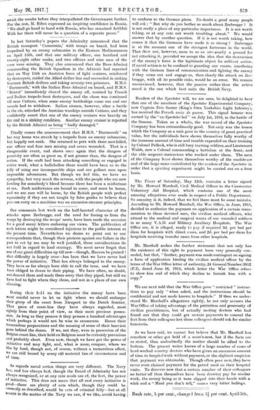As regards naval action things are very different. The Navy
bas, and has always had, though the Board of Admiralty has not ahvays recognized, or at any rate made use of, the fact, the power If initiative. This does not mean that all and every initiative is goed_h h hh uld be
ere are plenty o acts which, t oug they co correctly so described, would be acts of criminal folly—but at all events in the matter-of the Navy we can, if we like, avoid.. having Bank rate, 5 per cent., change.' from 3} per cent. April 50. — - to conform to the German plans. No doubt a good many people will ask : "But why do you bother so much about Zeebrugge? It is not really a place of any particular importance. It is not worth taking, or at any rate not worth troubling about." We would answer that by another question. If it is not worth taking, how comes it that the Germans have made it so strong ? Zeebrugge is at the moment one of the strongest fortresses in the world. That does not, however, seem to us as necessarily a ground for not attacking it., provided we accept the idea that the destruction of the enemy's force is the legitimate object for militant action. If naval action is to be confined to guarding our coasts, interfering with the German lines of communication and fighting the enemy if they come out and engage us, then clearly the attack on Zee- brugge, with all its possible risks, would be an error. We remain unconvinced, however, that the passive rather than the active mood is the one which best suits the British Navy.


























 Previous page
Previous page